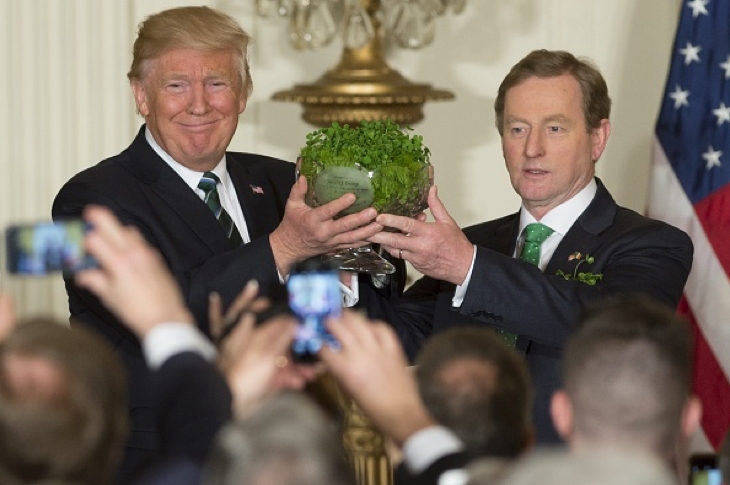We all have our roles. In the world order which we inhabit, Ireland has one chief international responsibility: each St Patrick’s Day, its Taoiseach (prime minister) sets off to the Oval Office bearing a bowl of shamrocks.
Ireland’s current Taoiseach, Enda Kenny, has been in the job since March 2011. In Ireland’s last elections, last February, he fell 29 seats short of an overall majority. From then, he started to face calls to resign. In February 2017, a scandal broke involving a whistleblower in the Gardaí, Ireland’s police. Kenny survived a confidence vote in February, but barely. Later that month, he addressed his parliamentary party, saying he would make the traditional trip to Washington, and then begin the process of selecting his successor. In the Oval Office, shamrock billowed forth from Kenny’s breast pocket.
The battle to succeed him will kick off the instant Kenny’s Aer Lingus flight lands in Dublin. Who wins isn’t important for the UK. That is, if you think who leads Ireland, as Northern Ireland’s peace institutions collapse and London looks for friends during Brexit, isn’t important.
The race is now neck-and-neck between two cabinet ministers, both thoroughbreds of Kenny’s party, Fine Gael. Fine Gael has slipped six points behind its arch-enemy party Fianna Fáil. What’s more remarkable is that the party is also a point behind Sinn Féin’s bearded wonder, Gerry Adams.
One aspiring Taoiseach, current Minister for Social Protection Leo Varadkar, is significant in the way a half-Indian gay doctor poised to take over Ireland is, in 2017, not really that noteworthy at all. His ethnicity and sexual orientation have not attracted much comment – a measure of the enormous social change that has taken place in Ireland.
The other, Simon Coveney, as housing minister has fearlessly developed a ‘help to buy’ housing programme recently for Ireland’s hapless first-time buyers. (He also has the distinction of having been expelled from Clongowes, Ireland’s Jesuit Eton.)
At a push, Coveney probably would be a more useful friend for Britain in Europe. He was a Member of the European Parliament before winning his current seat in 2007. He knows Brussels well. ‘I’d speculate that Coveney would take more of an EU-led focus as leader, given his time as an MEP,’ UCD’s Dr Caroline McEvoy tells me.
By contrast, Varadkar will be harder on the US, having already gone on the record saying he is loathe to invite Donald Trump to Ireland. Closer Anglo-American relations would irritate Varadkar’s Dublin more than Coveney’s. And there’s the fact, too, that Varadkar has said he’d like to see a united Ireland in the future.
Varadkar will be the change candidate, and Coveney will have stronger ties to the old guard. Coveney hails from a political dynasty – he is the son of TD Hugh Coveney and more distantly, from well-heeled local merchants in Cork. Varadkar is six years younger, at 38, and much of his appeal is to younger voters.
Those close to him say Coveney, as a minister, mastered his briefs and pushed policies effectively. ‘I think people have been impressed by his attention to detail,’ says Kieran McQuinn, a housing policy expert who has worked with him. ‘He wants results quite quickly, he is in a hurry–those would be the traits he would take with him if he were to be Taoiseach.’
Varadkar is one of a few government ministers to be a household name in Middle Ireland, and he would be a mightier foe against Ireland’s other parties at the next general election. According to polls, under the doctor’s orders Fine Gael would trounce its rival Fianna Fáil by 36-24, cleaving middle-class, university-educated younger voters from Fianna Fáil’s ranks. Coveney would still win, but it would be closer, 31-29.
In either case, Fianna Fáil’s able leader, Micheál Martin, has presented himself as the anti-Brexit candidate. For the UK, either Fine Gael leadership candidate would offer more help from within Europe, during the Brexit talks. Downing Street should waste no time cultivating ties.
Varadkar would be an exciting leader and signal to the world, if it hasn’t noticed, that Ireland has changed. He may, in fact, be better for Ireland. But with his CV in Brussels, his conservatism on the North, and greater resistance to Trump’s White House, Theresa May might prefer to try her luck with Coveney.






Comments